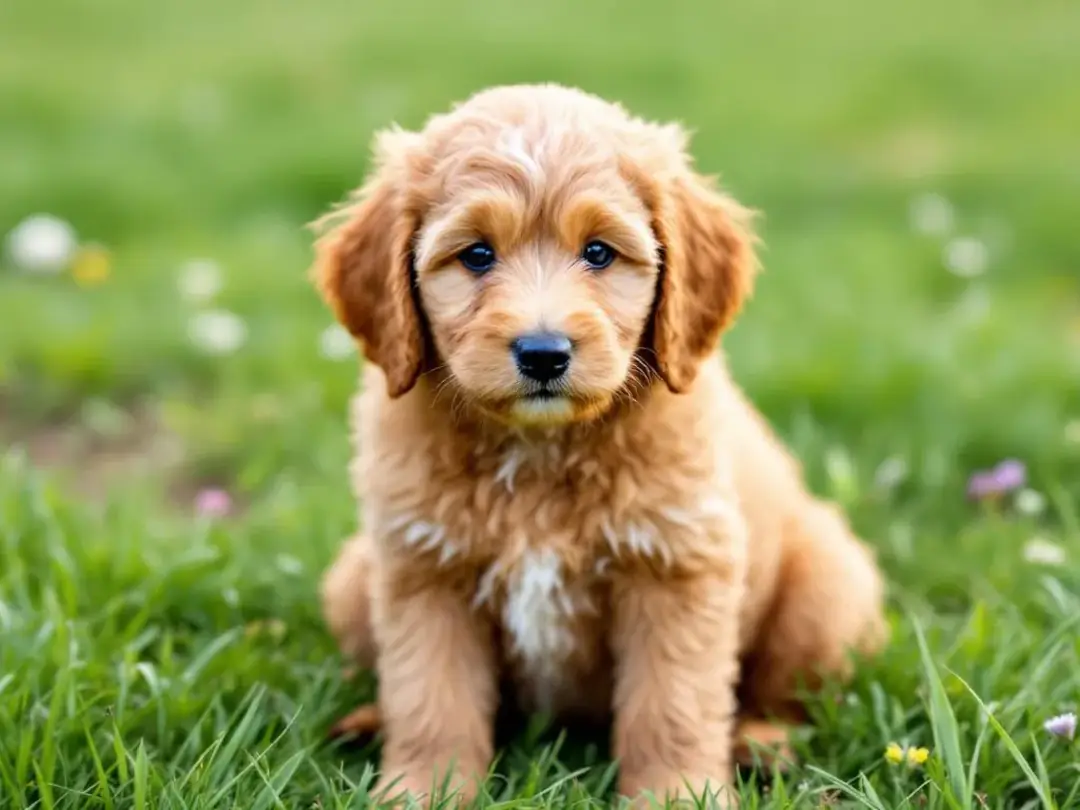Key Takeaways
-
F1 Goldendoodles are first-generation crosses between a purebred Golden Retriever and a purebred Poodle (50% each breed)
-
F1 Goldendoodles belong to the broader group of doodles, which also includes F1B and F2 Goldendoodles; each generation of doodles has unique coat types and temperament traits
-
They typically have wavy to loose curly coats with minimal to moderate shedding, suitable for families with mild allergies
-
F1 generation offers the strongest hybrid vigor and combines the best personality traits of both parent breeds
-
These dogs are ideal for families wanting Golden Retriever temperament with reduced shedding compared to purebred retrievers
-
F1 Goldendoodles come in three sizes (standard, medium, and mini) depending on the Poodle parent used
Introduction to Goldendoodles
Goldendoodles are a popular hybrid breed created by crossing a Golden Retriever with a Poodle. This unique combination brings together the best qualities of both parent breeds: the friendly, loyal temperament of Golden Retrievers and the intelligence and low-shedding coat of Poodles. As a result, Goldendoodles have become a favorite among families looking for a companion that is both affectionate and easy to train.
One of the essential things for potential owners to understand is the concept of Goldendoodle generations. The generation of a Goldendoodle-such as F1, F1B, F2, or multigenerational-refers to the specific breeding and genetic makeup of the dog. These generations influence the dog's physical traits, temperament, and, importantly, the amount of shedding you can expect. Selective breeding allows breeders to emphasize certain characteristics, such as coat type or personality, making it easier for families to find a Goldendoodle that fits their lifestyle.
Whether you're drawn to the playful nature of the Golden Retriever or the hypoallergenic qualities of the Poodle, understanding the different Goldendoodle generations is key to choosing the right companion. Each generation offers its own blend of traits, making Goldendoodles a versatile breed that can meet the needs of a wide range of owners and families.
What is an F1 Goldendoodle?
An F1 Goldendoodle represents the foundation of all goldendoodle generations. The "F1" designation comes from scientific terminology meaning "filial 1" or first generation. This means you get a puppy whose parents are a purebred Golden Retriever and a purebred Poodle-nothing more, nothing less.
The genetic makeup is straightforward: golden retriever 50 poodle 50. Unlike later generations where selective breeding creates more complex genetic combinations, the F1 generation goldendoodle offers the purest example of hybrid vigor. In later generations, breeders use control over the breeding process to stabilize desirable traits, resulting in more predictable temperaments and physical characteristics in multigenerational doodles. This first filial generation serves as the foundation for all other goldendoodle generations, from F1B to multigen varieties.
What makes F1s special compared to other doodle crosses? They exhibit the greatest genetic diversity within their lineage. When a poodle crossed with a Golden Retriever produces offspring, each puppy receives a unique combination of traits from both parent breeds. Understanding a dog's line helps predict traits, coat types, and health qualities, allowing breeders and buyers to make informed decisions based on lineage and breeding practices. This genetic lottery creates dogs that are generally healthier than their purebred parents while maintaining the desirable characteristics that made this cross so popular.
The significance of choosing a first generation goldendoodle lies in getting that pure hybrid vigor effect. Earlier generations like F1 tend to have fewer hereditary health issues because the mixing of different genetic lines can mask harmful recessive genes that might appear in purebred dogs. A common mistake is to use the wrong terminology when describing Goldendoodle generations, so it's important to use accurate breed descriptions to avoid confusion.
While understanding these technical terms and generations is helpful, new owners should remember that the personality and coat type of the pup they are considering are often more important than the specific generation label.
F1 Goldendoodle Physical Characteristics
F1 Goldendoodles come in three distinct size categories, determined entirely by which type of Poodle is used in the breeding program. Standard F1 Goldendoodles result from crossing with a Standard Poodle and typically weigh 50-90 pounds. Medium F1s, bred with Miniature Poodles, usually fall between 30-50 pounds. Mini F1 Goldendoodles, created using Toy or Miniature Poodles, generally weigh 15-30 pounds.
The coat types in F1 Goldendoodles show remarkable variety, even within the same litter. Most exhibit wavy coats that represent a compromise between the straight Golden Retriever coat and the curly Poodle coat. Some puppies may inherit more dominant traits from one parent, resulting in loose curly coats or occasionally straighter coats reminiscent of their Golden Retriever heritage.
Color variations span the spectrum from cream to deep red. Common colors include:
-
Cream and light golden (from English Golden Retriever influence)
-
Golden and darker golden shades
-
Red and apricot tones
-
Buff and champagne hues
Physical traits combine features from both parent breeds in unpredictable ways. You might see a dog with the Golden Retriever's friendly facial expression but the Poodle's more refined bone structure. The teddy bear appearance that many families love comes from this unique blending of characteristics.
Height ranges vary significantly based on the Poodle parent used. Standard F1s typically stand 20-24 inches at the shoulder, while medium varieties range from 17-20 inches, and minis usually measure 13-17 inches tall.
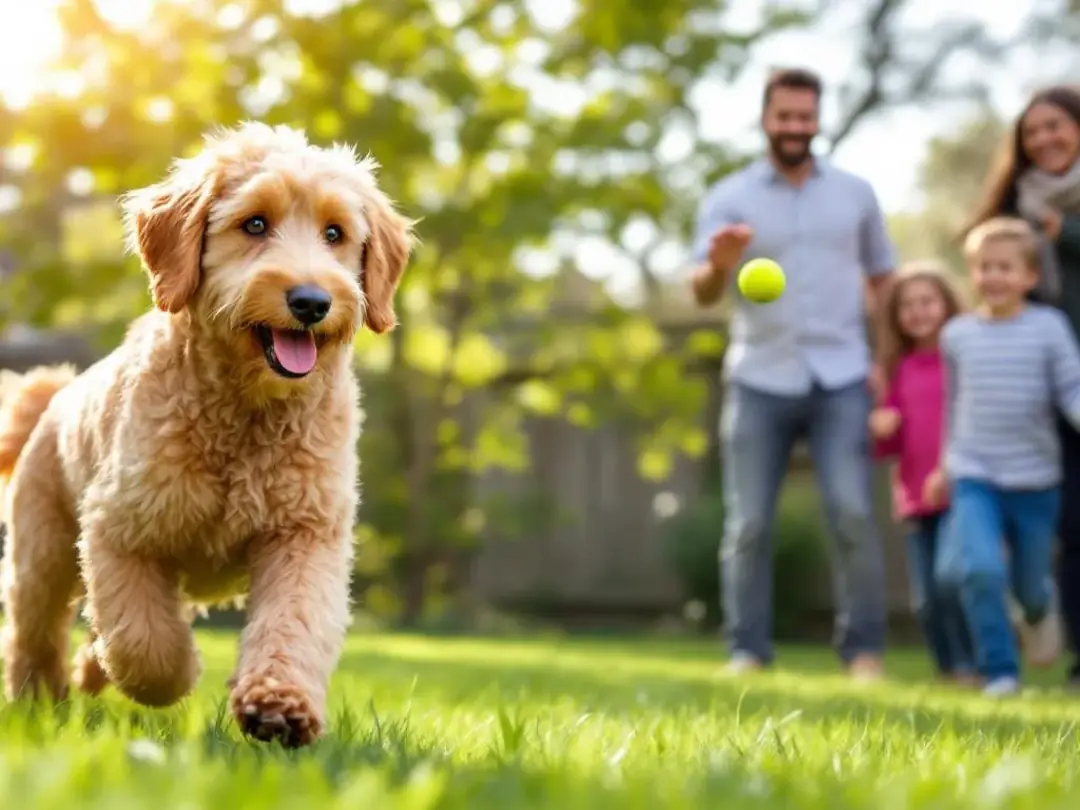

Temperament and Personality Traits
The personality of an F1 Goldendoodle represents one of the most compelling reasons families choose this generation. These dogs inherit the Golden Retriever's legendary friendliness combined with the Poodle's sharp intelligence, creating companions that are both loving and trainable.
Most families find their F1 Goldendoodle to be naturally social and outgoing. The Golden Retriever temperament shines through in their eagerness to please and genuine enjoyment of human companionship. Meanwhile, the Poodle influence contributes problem-solving abilities and a playful nature that keeps interactions interesting.
Energy levels typically fall into the moderate to high range, requiring 60-90 minutes of daily exercise split across multiple sessions. These dogs tend to be more active during their first few years, gradually settling into a calmer routine as adults. The intelligence inherited from both breeds means they need mental stimulation alongside physical activity.
Trainability ranks among their strongest characteristics. The combination of Golden Retriever eagerness to please and Poodle intelligence creates dogs that typically excel in obedience training. Most owners describe their F1 Goldendoodles as quick learners who respond well to positive reinforcement methods.
Compatibility with children and other pets is generally excellent, though individual personality can vary more in F1s compared to later generations. The Golden Retriever influence usually ensures a patient, gentle nature around kids, while proper socialization during puppyhood helps ensure good relationships with other animals in the house.
Shedding and Allergy Considerations
Shedding in F1 Goldendoodles falls somewhere between their parent breeds, making them suitable for families with mild allergies but not necessarily those with severe sensitivities. Unlike non shedding coats found in higher Poodle percentage crosses, F1s typically exhibit reduced shedding rather than complete elimination.
The furnishing genes inherited from the Poodle parent play a crucial role in determining coat characteristics. Dogs that inherit these genes tend to have wavy to curly coats with minimal shedding. However, not all F1 Goldendoodles inherit the furnishing genes, which means some may shed more like their Golden Retriever parent.
For allergy sufferers, it's essential to understand that no dog is truly hypo allergenic. F1 Goldendoodles produce less dander than Golden Retrievers on average, but individual dogs vary significantly. Families dealing with allergies should spend time with the specific puppy they're considering rather than assuming all F1s will be allergy friendly.
Compared to F1B Goldendoodles (75% Poodle, 25% Golden Retriever), F1s generally shed more. The F1B generation and F1BB varieties offer better options for families requiring non shedders. However, many families find F1 shedding levels perfectly manageable with regular grooming.
The reality is that most F1 Goldendoodles fall into the "low to moderate shedding" category. They're not the non shedding coats some marketing might suggest, but they're significantly better than purebred Golden Retrievers for families concerned about hair around the house.
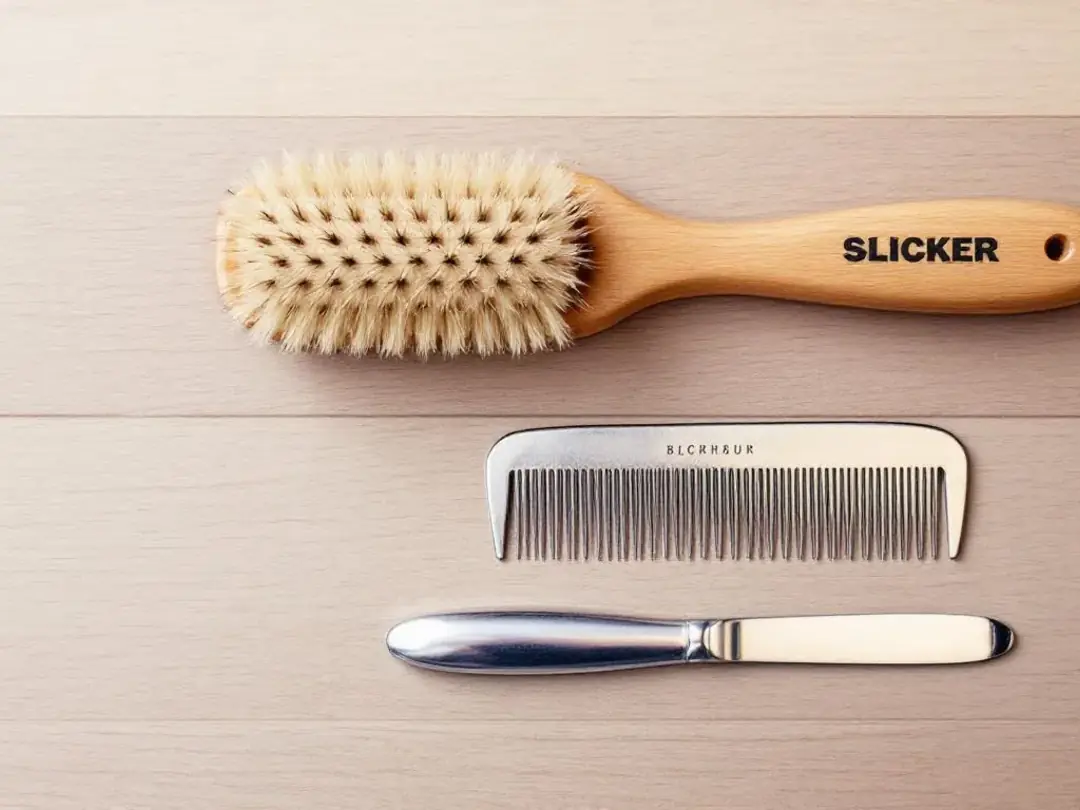

Grooming Requirements
Grooming an F1 Goldendoodle requires consistent attention but doesn't need to be overwhelming. Professional grooming every 6-8 weeks keeps their coat healthy and manageable, while daily brushing prevents the matting that wavy and curly coats are prone to develop.
The right tools make all the difference. A quality slicker brush works well for daily maintenance, while a metal comb helps detect and work through any tangles before they become serious mats. Focus extra attention on areas where matting commonly occurs: behind the ears, under the collar, around the legs, and anywhere the coat rubs against itself.
Most F1 Goldendoodles benefit from a grooming routine that includes:
-
Daily brushing (5-10 minutes)
-
Weekly ear cleaning
-
Nail trimming every 2-3 weeks
-
Professional cuts every 6-8 weeks
-
Baths as needed (usually monthly)
Seasonal coat changes can affect grooming needs. Many F1 Goldendoodles develop thicker coats in winter and may shed more during spring transitions. Adjusting your brushing frequency during these periods helps maintain coat quality and reduces loose hair around the house.
The investment in regular grooming pays off in multiple ways. Well-maintained coats are healthier, more comfortable for your dog, and significantly easier to manage long-term. Skipping grooming sessions often leads to matting that requires expensive professional removal or even complete shaving.
Health and Hybrid Vigor
The health advantages of F1 Goldendoodles stem from the genetic phenomenon known as hybrid vigor. When two different breeds cross, the resulting offspring often exhibit improved health and vitality compared to their purebred parents. This occurs because the mixing of different gene pools can mask harmful recessive genes that might cause problems in purebred lines.
F1 Goldendoodles may inherit health issues from either parent breed, but the risk is generally lower than in purebred dogs. Golden Retrievers are prone to hip dysplasia, certain cancers, and eye disorders, while Poodles can develop hip dysplasia, bloat, and progressive retinal atrophy. However, the genetic diversity in F1 crosses typically reduces the likelihood of these conditions manifesting.
Expected lifespan for F1 Goldendoodles ranges from 10-15 years, similar to both parent breeds. The key to maximizing this lifespan lies in choosing puppies from health-tested parents and maintaining good preventive care throughout their lives.
Health testing becomes essential when selecting a breeder. Responsible breeders perform comprehensive health screening on both parent dogs, including:
-
Hip and elbow evaluations
-
Eye clearances
-
Heart clearances
-
Genetic testing for breed-specific conditions
Regular veterinary care should include annual wellness checks, appropriate vaccinations, parasite prevention, and monitoring for any developing health issues. The hybrid vigor effect provides some protection, but it doesn't guarantee perfect health, making ongoing medical care just as important as with any dog.
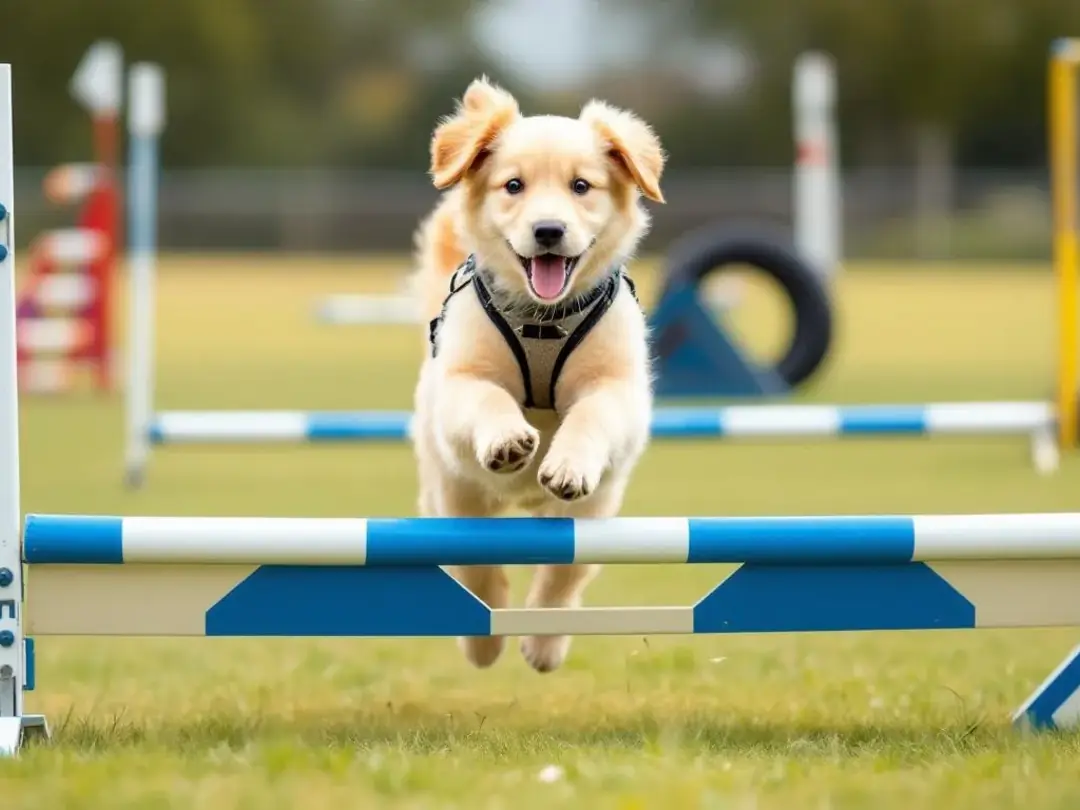

Training and Exercise Needs
Training an F1 Goldendoodle is generally a pleasant experience thanks to their inherited intelligence and eagerness to please. The combination of Golden Retriever trainability and Poodle problem-solving abilities creates dogs that learn quickly and retain lessons well.
Basic obedience training should start early and focus on four essential commands: name response, sit, down, and recall. These form the foundation for managing daily life and ensuring safety. Most F1 Goldendoodles master these basics within a few weeks of consistent practice.
Exercise requirements are substantial but manageable when approached systematically. Aim for 60-90 minutes of daily activity split into multiple sessions. This might include:
-
Two 20-30 minute walks
-
15-20 minutes of fetch or active play
-
Mental stimulation through training or puzzle games
-
Free play in a securely fenced area
The intelligence of F1 Goldendoodles means they need mental stimulation alongside physical exercise. Boredom can lead to destructive behaviors, so rotate activities and introduce new challenges regularly. Many owners find their F1 Goldendoodles excel at activities like agility, obedience competitions, or even therapy work.
Socialization during puppyhood sets the foundation for a well-adjusted adult dog. Expose your puppy to various people, places, sounds, and experiences in a positive, controlled manner. The naturally friendly temperament of most F1 Goldendoodles makes this process easier, but it's still essential for developing confidence and appropriate social skills.
F1 vs Other Goldendoodle Generations
Understanding the differences between goldendoodle generations helps you choose the right fit for your family's needs. Each generation offers distinct advantages depending on your priorities regarding shedding, predictability, and health.
F1B Goldendoodles result from crossing an F1 Goldendoodle back to a purebred Poodle, creating a 75% Poodle, 25% Golden Retriever mix. This generation typically offers better results for allergy sufferers due to higher Poodle genetics, but may require more intensive grooming due to curlier coats.
F2 Goldendoodles come from breeding two F1 parents together, maintaining the 50/50 genetic split but potentially losing some hybrid vigor. The second generation can show more variation in traits compared to F1s, making outcomes less predictable.
Multigen Goldendoodles involve selective breeding over multiple generations to achieve specific traits. While these dogs may offer more consistency in coat type and temperament, they often exhibit less of the robust health associated with first-generation crosses.
The advantages of choosing F1 generation include:
-
Maximum hybrid vigor and health benefits
-
Balanced temperament from both breeds
-
Generally easier grooming than higher Poodle percentages
-
Good option for families with mild allergies
-
More predictable personality traits than F2 or later generations
Consider other generations when you need guaranteed non-shedding coats (F1B or multigen) or have severe allergies requiring maximum hypoallergenic qualities.
F1B Goldendoodles
F1B Goldendoodles are a popular choice for families seeking a dog with even less shedding and more allergy-friendly qualities than the original F1 generation. This generation is produced by crossing an F1 Goldendoodle (which is 50% Golden Retriever and 50% Poodle) back to a purebred Poodle. The result is a dog that is approximately 75% Poodle and 25% Golden Retriever.
Thanks to their higher percentage of Poodle genetics, F1B Goldendoodles typically have curly coats that shed very little, making them an excellent option for families with allergy concerns. These curly coats are not only attractive but also help reduce the amount of dander and hair in the home. F1B Goldendoodles inherit the intelligence and trainability of Poodles, along with the friendly, loyal personality of Golden Retrievers, resulting in dogs that are both smart and affectionate.
Their calm demeanor and low-shedding coats make F1B Goldendoodles a top choice for therapy and service dog work, as well as for families with children. While breed tendencies are generally predictable, it's important to remember that each dog is an individual, and personality and characteristics can vary. Overall, F1B Goldendoodles offer a wonderful blend of traits for those seeking a loving, low-shedding companion.
Teddy Bear Goldendoodles
Teddy Bear Goldendoodles are beloved for their irresistibly cute, plush appearance that resembles a stuffed animal. This look is typically achieved by crossing an English Golden Retriever with a Poodle, resulting in a dog with a round face, expressive eyes, and a soft, fluffy coat. The English Golden Retriever influence often gives these Goldendoodles a blockier build and a lighter coat color, enhancing their teddy bear charm.
Beyond their adorable looks, Teddy Bear Goldendoodles are known for their gentle, affectionate personalities. They are friendly, outgoing, and thrive as part of a family, making them ideal companions for children and adults alike. Their coats are usually low-shedding, thanks to the Poodle genetics, which is a big plus for families concerned about allergies or keeping their homes clean.
It's important to note that "Teddy Bear" refers to the dog's appearance rather than a specific Goldendoodle generation. Breeders use this term to describe Goldendoodles with the classic teddy bear look, regardless of whether they are F1, F1B, or another generation. If you're looking for a dog with a sweet personality and a cuddly, teddy bear-like appearance, this type of Goldendoodle is sure to win your heart.
F2 Goldendoodles
F2 Goldendoodles represent the second generation in Goldendoodle breeding, created by crossing two F1 Goldendoodles. This generation maintains a 50% Golden Retriever and 50% Poodle genetic split, but the combination of genes can lead to a wider variety of coat types and shedding levels compared to earlier generations.
One of the defining characteristics of F2 Goldendoodles is their unpredictability. Some dogs may inherit curly coats that shed very little, making them suitable for allergy sufferers, while others may have straighter coats that resemble the Golden Retriever and shed more. This variation means that families interested in a specific coat type or level of shedding should spend time with individual puppies to find the best match.
Despite the range in coat types, F2 Goldendoodles are consistently known for their friendly, intelligent personalities and make excellent family pets. They are also commonly used in breeding programs to produce later generations, such as F2B or multigenerational Goldendoodles, which can offer even more predictable traits for those with allergies or specific preferences. If you're seeking a Goldendoodle with a unique blend of characteristics and don't mind a bit of unpredictability in coat type, the F2 generation is a wonderful option.
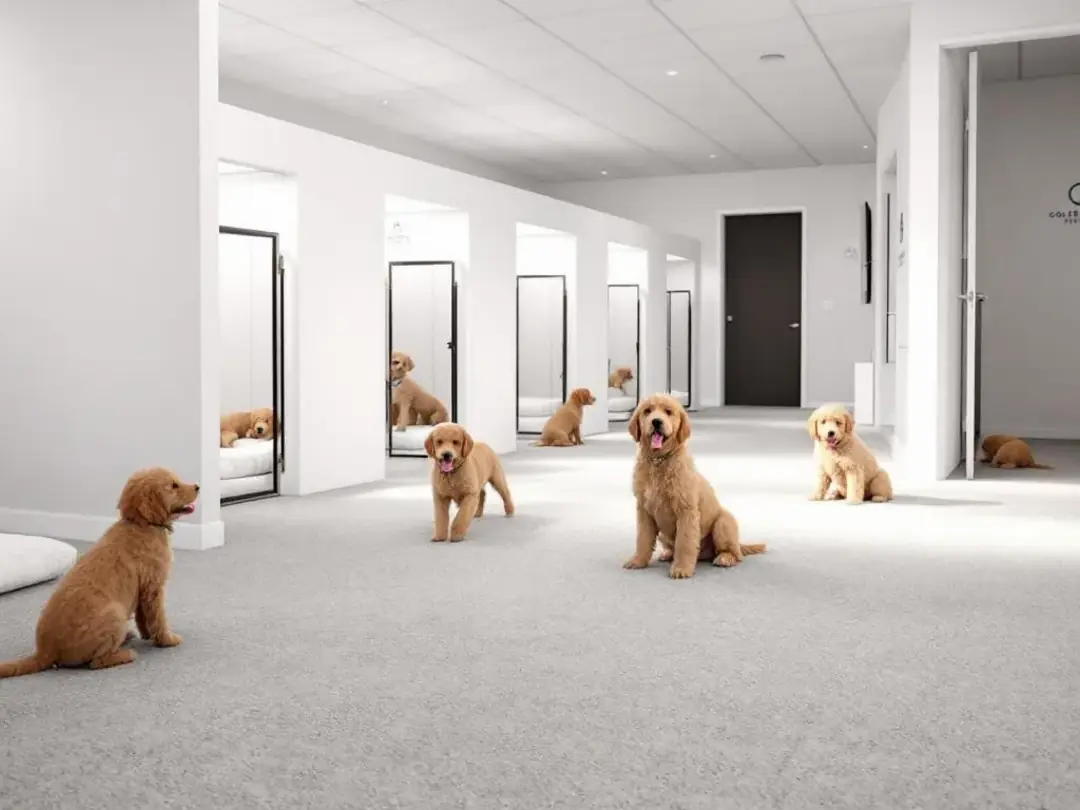

Choosing an F1 Goldendoodle Breeder
Selecting the right breeder determines the quality and health of your future companion. The best breeding programs prioritize health testing, proper socialization, and matching puppies to appropriate families rather than simply producing the most offspring.
Health testing in parent dogs is non-negotiable. Both the Golden Retriever and Poodle parents should have current clearances for hips, elbows, eyes, and hearts. Many quality breeders also perform genetic testing to screen for inheritable conditions. Ask to see actual documentation rather than taking verbal assurances.
GANA (Goldendoodle Association of North America) provides guidelines for ethical breeding practices. While membership isn't required, breeders who follow GANA standards typically demonstrate higher commitment to breed improvement and puppy welfare.
Questions to ask potential breeders include:
-
Can I see health clearances for both parents?
-
How do you socialize puppies before they go home?
-
What health guarantee do you provide?
-
Can I meet at least one parent dog?
-
How do you select which puppies go to which families?
Red flags to avoid include breeders who:
-
Won't show health testing documentation
-
Have multiple litters available constantly
-
Don't ask you questions about your lifestyle
-
Offer to ship puppies without meeting you
-
Can't provide references from previous puppy buyers
Expected pricing for F1 Goldendoodles from reputable breeders typically ranges from $1,500-$3,000, depending on location, breeder reputation, and specific bloodlines. Significantly lower prices often indicate corners being cut in health testing or care.
The puppy selection process should involve careful matching of individual personalities to family needs. Good breeders evaluate each puppy's temperament and energy level, then recommend the best fit based on your experience level and lifestyle.
Living with an F1 Goldendoodle
Daily life with an F1 Goldendoodle revolves around their social nature and moderate to high energy levels. These dogs thrive in households where they're included in family activities rather than left alone for extended periods. Most families find their F1 Goldendoodle becomes a central part of daily routines within weeks of arrival.
Space requirements vary by size, but all F1 Goldendoodles benefit from access to a securely fenced yard. Standard-sized dogs obviously need more room to exercise and play, while mini varieties can adapt well to apartment living provided their exercise needs are met through walks and activities.
Cost considerations extend far beyond the initial purchase price. Budget for:
-
Professional grooming every 6-8 weeks ($75-150 per session)
-
Quality food ($50-100 monthly)
-
Routine veterinary care ($500-1000 annually)
-
Training classes and supplies ($200-500 initially)
-
Pet insurance or emergency fund ($500-2000 annually)
The long-term commitment spans 10-15 years, during which your lifestyle will likely change multiple times. Consider how a dog will fit into potential moves, career changes, family additions, and other life transitions. F1 Goldendoodles are adaptable, but they require consistent care and attention throughout their lives.
Benefits of F1 Goldendoodles as family pets include their natural affinity for children, trainability that makes them suitable for first-time dog owners, and moderate shedding that won't overwhelm most households. Their size options mean families can choose a dog that fits their living situation, while their friendly nature makes them excellent ambassadors for the family in social situations.
Many owners describe the positive things about living with F1 Goldendoodles: their intuitive understanding of family routines, their ability to adjust energy levels to match the household, and their genuine enjoyment of being included in activities. These characteristics make them particularly suitable for active families who want a dog that can keep up with various adventures while also being calm enough for quiet evenings at home.
FAQ
Are F1 Goldendoodles better than F1B for first-time dog owners?
F1 Goldendoodles are often better suited for first-time dog owners because they typically have more predictable temperaments and slightly easier grooming requirements. While F1B Goldendoodles offer better allergy-friendly qualities, their curlier coats require more intensive maintenance that can overwhelm new owners. F1s provide a good balance of reduced shedding without the complex grooming needs of higher Poodle percentage crosses.
How much do F1 Goldendoodles typically cost from reputable breeders?
Expect to pay $1,500-$3,000 for an F1 Goldendoodle from a quality breeder who performs comprehensive health testing on parent dogs. Prices vary by location, with urban areas typically commanding higher prices. Mini F1 Goldendoodles often cost slightly more than standard sizes due to higher demand and smaller litter sizes. Remember that the initial cost is just the beginning-factor in ongoing expenses for grooming, food, veterinary care, and supplies.
Can F1 Goldendoodles be left alone during work hours?
Adult F1 Goldendoodles can typically handle 6-8 hours alone, but they're social dogs who prefer company. Puppies should never be left alone for more than a few hours and need gradual conditioning to longer periods. Provide mental stimulation through puzzle toys and ensure adequate exercise before and after work. Many owners find doggy daycare or pet sitters helpful for maintaining their dog's social needs during long work days.
Do F1 Goldendoodles make good therapy or service dogs?
F1 Goldendoodles can excel as therapy dogs due to their friendly nature and intelligence inherited from both parent breeds. However, for service dog work, later generations like F1B or multigen Goldendoodles are often preferred because they offer more predictable temperaments and coat characteristics. The individual dog's personality and training matter more than generation, but F1s show enough variation that careful selection is essential for service work.
What is the best age to bring home an F1 Goldendoodle puppy?
Eight weeks is the minimum age, but many breeders prefer to keep puppies until 10-12 weeks for additional socialization and development. This extra time allows for more complete neurological development and better bite inhibition training from littermates. Puppies who stay with their mothers and siblings longer often adjust more easily to their new homes and demonstrate better social skills with other dogs throughout their lives.

